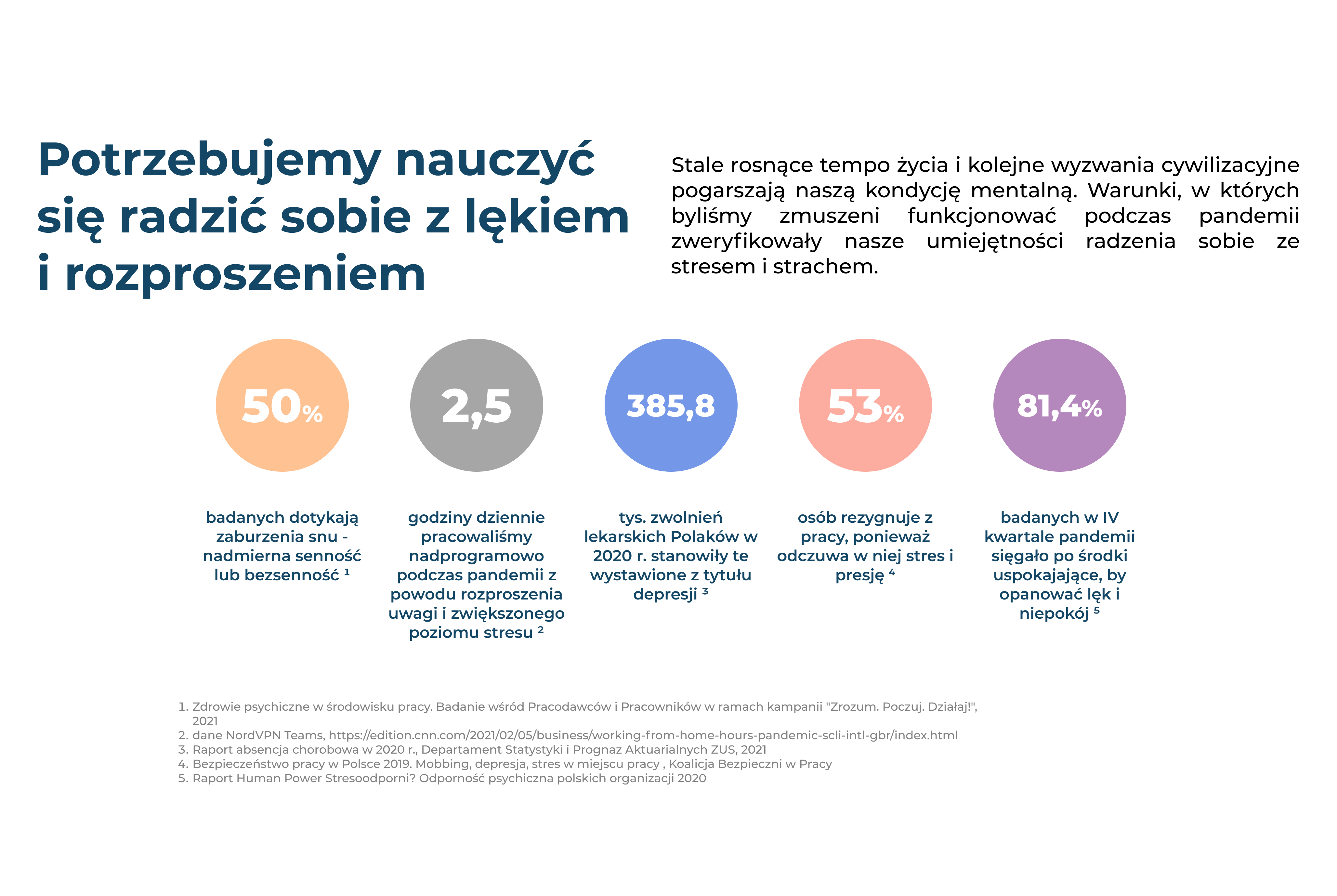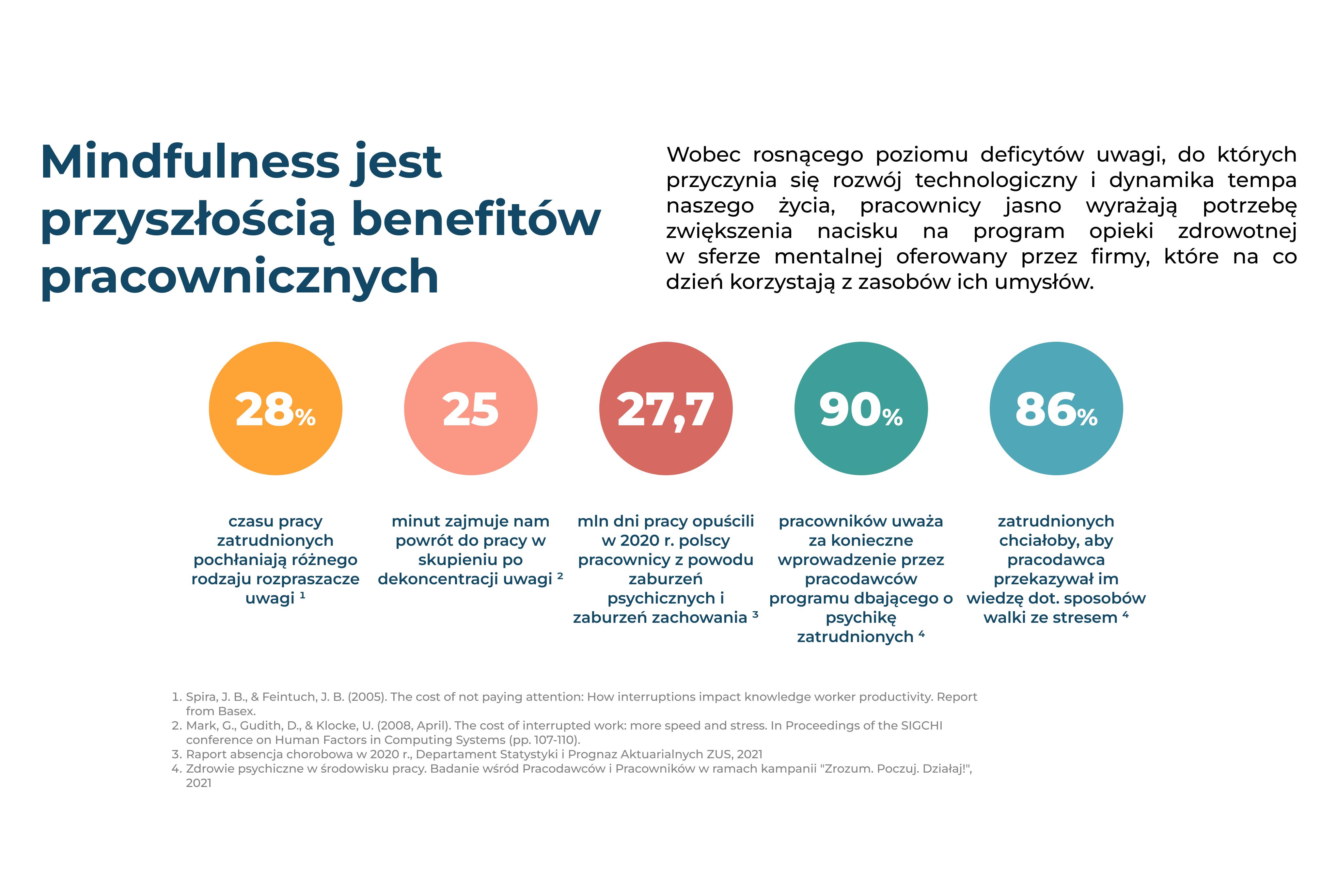Are there enough webinars to solve a huge mental health problem?
3/15/2023
Are there enough webinars to solve a huge mental health problem?
Getting employees to engage in webinars is often the most difficult part of organizing such meetings. And while they most often bring great value, they can also be a stress inducer. Especially when they "fall" into an already busy schedule. As a result, a webinar is running on one monitor, another email is being created on another, and there is confusion, lack of concentration and stress in the head, because deadlines are pressing, the boss is watching, others are listening for answers. And yet, it is worthwhile to focus and not combine it with "multitasking".
Nearly one in three employees is tired of webinars (Mindy Report, 2021). What if there was more opportunity to choose the topic, date and location?

Mental health in numbers
In Poland, 1.5 million people receive psychiatric treatment. Importantly, these figures do not include statistics on therapy in private offices (it is estimated that this could be another 1 million). One in five Poles suffers from various mental problems and disorders. In Europe, 45 million people have experienced depression, which is projected to be the most popular disease as early as 2030. Situations such as the pandemic or the war in Ukraine only accelerate mental health problems, reveal or worsen them, renew episodes. This is a huge problem affecting people, but also business. According to the study, business loses as many as 36 work days per employee per year through deteriorated mood. Comparing 2019 to 2020, the number of days during which employees were on leave due to mental problems increased by as much as 58% (Medicover, 2021). So it's worth looking at the cost of wellbeing tools as an investment. What kind of return will it give? According to Deloitte, PLN 5 out of every zloty.
What do employees in Poland face?
Stress affects 60% of employees, including 11% to a very high degree (the rate is significantly higher among women). Short sleep does not help improve this situation, and as employees declare, one in three of them sleeps less than the recommended 7-9 hours a day. Problems with concentration (48%) and frequent mood changes (39%) also line up in the domain of consequences. How do employees in Poland cope with these difficulties? The most popular form of relaxation is physical activity. It's a good way to discharge emotions and increase endorphins

It is worth noting that, like muscles, the mind can be trained. However, this is still a new area for employees in Poland, as 63.1% of them have never tried meditation, and 41% have not been exposed to at least breathing exercises. And it's a "first-aid kit" for stress that we always carry with us. During one of the interviews, Maja Gojtowska pointed out, the biggest problem of benefits is their inadequate communication. Employees often do not know the value that the solutions offered can bring to their lives. As a result, it is difficult for them to find time for them. As a result, the company pays for something that does not have this effect. Why?
Where to start?
Most mental health support solutions focus on treatment. However, needs vary - not every employee requires or would like a consultation with a therapist, a doctor. Regardless, it is worthwhile to strengthen mental wellbeing and prepare the mind for difficult moments and stress in the future. After all, prevention is better than cure. In the context of health, this resounds especially clearly. How to do it? First of all, responsibly and based on science. Interestingly, employees can take care of themselves! If they are given the right tools.
(In)available solutions
Prevention is no substitute for therapy or treatment. But while not everyone needs the support of a specialist, mental strengthening activities (meditation, breathing exercises, mindfulness training) are a "vitamin" for the benefit of all. Looking at the availability of specialists in Poland, or rather the lack thereof (9 experts per 100,000 people), the realization that we can help ourselves and develop mental resilience is encouraging. In bridging the gap between the need and the possibility of care and support, it is worth paying attention to solutions available to everyone, everywhere and anytime, such as a mobile app.
According to employees, preventive mental health solutions should, above all, be easily accessible (76%), free (35.2%), anonymous (34.7%) and based on scientific research (50.4%). Among the specific tools companies can offer, desktop meetings with experts are the most preferred (45.4%), followed by access to a mobile app (41.6%). One in three employees also think it's a good idea to introduce short meditation breaks during work. Such activities definitely have a direct impact not only on mental wellbeing, but also on the organization's culture, increasing empathy and trust within the team.

Team relationships and mental health
How does the topic of mental health look in your companies? Is it still a taboo subject? As many as 81.3% of employees are afraid to report the need for preventive support to their boss (treatment 84.7%). The key in this area is mutual trust combined with the anonymity of the solution, a sense of security and privacy. Leaders are increasingly talking openly about using support, breaking down the barrier built around this topic. So what is missing when employees rated the company's engagement in the mental health sphere at 2+? Action? A significant part of the answer consists of survey results. Unfortunately, according to 46% of employees, work life worsens the state of their mental condition, and half believe they have been affected by job burnout in the past year.
I put forward a thesis: the company is an ideal place to start building resilience to stress, attentiveness, development of concentration. And I argue: as many as 76% of employees would like to use such a tool, but one in three "of us", when our mental well-being drops, does NOTHING and waits for it to pass on its own. Jacek Santorski calls this the "Polish character" involving a low sense of agency. On a European level, it is the fear of seeing a specialist in 38% that makes us choose not to support mental fitness. It's only 20% a financial problem (Statista, 2021).

An hour or 10 minutes?
Probably the most common answer to why we don't take care of our working tool, the mind, is lack of time. But what if I told you that even 10 minutes a day is enough? The most important thing is to take care of yourself on a regular basis, and it is in building this habit that the Mindy app supports employees. It's a wide range of support for personal development, overcoming stress and difficulties, better concentration, relaxation and even healing. I know because we are recommended "in between sessions" by therapists and psychologists. It is their knowledge and experience that we draw on when creating content for the app. There are over 400 hours of courses, knowledge, self-therapeutic and developmental exercises, psychoeducation, recordings for better sleep, relaxation techniques and mindfulness practices. Always at your fingertips, anonymously and according to science.
Do you want to make your employees healthy and happy?
Or contact us via email contact@activy.app